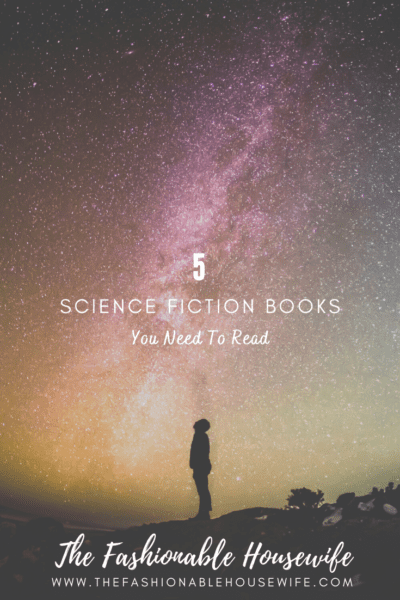
The world is increasingly troubling these days, and from a human perspective, 2020 has been insane. It can feel hard to be balanced right now, and something lighter can give your mind a break. If you are looking for escapism by reading about a universe far away or merely searching to expand your mind through a journey into a different dimension, then the science fiction genre is for you!
Sci-fi is in a perpetual state of flux, and coming up with a different canon will vary from person to person, author to author. Of course, there are classics throughout the genre that have stood apart from their peers: Frank Herbert’s Dune, Ursula K. LeGuin’s The Left Hand of Darkness, or Isaac Asimov’s The Foundation Series.
These books are iconic not only for providing readers with a lot to think about but also for impacting the writers that read them, influencing technique, subject matter, and perspective. Over the last 15 years, science fiction has had a period of transition. Many more people write stories than ever before, from every background to various new platforms that didn’t exist earlier. During this transition, there have been plenty of novels that have broken the glass ceiling and changed science fiction books’ face.
If you love your sci-fi with a heaping side of humor, then you have come to the right place! There are so many light-hearted science fiction books out there that deserve a more widespread audience. We have banded together with five of the best older and newer Sci-Fi books that should be on your radar.
1. The Long Way to a Small Angry Planet by Becky Chambers.
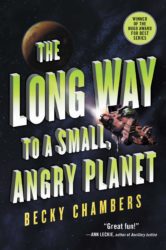
Ever since the advent of cyberpunk (and Frank Miller’s take on Batman in the 80s), It seems like the entire field of sci-fi has gravitated somewhat towards the theme of grim realism. The world is a dark and rage-filled place, one where life is meaningless and terrible things happen. And there are plenty of good books with genuine insight that adopts it, such as The Windup Girl or The Water Knife by Paulo Bacigalupi or Richard K. Morgan’s Altered Carbon.
That’s why Becky Chambers’s debut novel was such a breath of fresh air for many readers. The Long Way to a Small and Angry Planet is an endlessly optimistic sci-fi story that follows Rosemary Hopper, a young woman who joins a ship’s crew to create wormhole tunnels. It follows the ship, the Wayfare, as they travel across the galaxies stopping by planets.
For ones who like the Firefly type of space opera, this cozy read will feel familiar. Chambers takes a keen interest in breaking down each of the crew members’ interpersonal goings and workings and how they entangle together. It is a book that understands civilization and communities as a whole, which operate through a sense of empathy, compassion, and understanding for each other.
2. Hitchhiker’s Guide to the Galaxy by Douglas Adams.
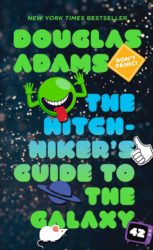
So the last sentence of this book is – So long and thanks for all the fish. – which should perfectly sum up how completely insane this book is. We all find ourselves reading something that is so unwittingly funny that we find ourselves quoting it now and then. This is that book.
The main protagonist Arthur Dent is rescued off the planet by his friend Ford Prefect, a researcher for the revised edition of the Hitchhiker’s Guide to the Galaxy, mere seconds before the planet is destroyed to make way for a galactic expressway. Together this dynamic duo begins a journey through space accompanied by a variety of characters.
This book is also mentioned in Cool Things Chicago’s list of the best science fiction books of all time.
3. The Three-Body Problem by Cixin Liu.
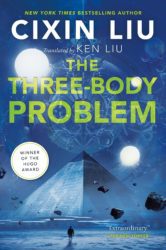
This novel and its sequels are ambitious books that explore humanity’s place in the Cosmos. The trilogy follows humankind‘s discovery of an alien civilization and the subsequent invasion of earth, starting during the Chinese cultural revolution and continuing to the universe’s death. Along with that, Liu also explores how dangerous life in the larger universe could be, throwing in some musings about technological utopias, dystopia, massive space battles, and everything else one could think of.
The book has been praised by President Barack Obama and CEO of Facebook Mark Zuckerberg, which has led to more visibility for a larger science-fiction audience in China. This increased awareness of Chinese science fiction has transformed into more interest in science fiction worldwide, showing that it isn’t just a North American/ European style of storytelling but a global one.
4. The Martian by Andy Weir.
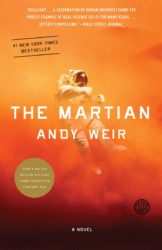
The author worked as a programmer for a number of software companies over the course of his early career while writing short stories on his website. Around the same time, Weir began writing a book about a standard astronaut on Mars in which he worked out how a realistic breakdown of things on Mars would play out.
It is because of his realism that The Martian grabbed a lot of people’s attention: as Weir paid a considerable amount of time getting the details right for a grounded and accurate mission to Mars. The story follows the main character Mark Watney and everything he needed to survive: how he grew his food, how he communicated with Earth, and ultimately his escape from the planet.
5. Space Opera by Catherynne M. Valente.
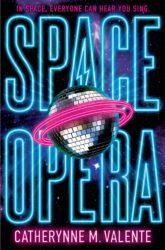
After the Galaxy was torn apart by war, Galactic Vision was created to bring back those that were left together to lift up spirits. It’s an event that’s a part beauty pageant, part concert, part gladiatorial fight, and part continuation of the war of the past.
Humanity has now discovered it, and the representing band, Decibel Jones and the Absolute Zero, will determine the fate for all of the earth. This novel is charged with energy full of Valente’s unique style featuring frenzied, hyper run-on sentences.
The best science fiction books act as a fascinating exercise that involves world-building, creating an inclusive and far-flung landscape for us to lose ourselves in, with brilliant characters to guide us. Sci-fi books shine light upon the big questions of the present while also expressing the author‘s fears and hopes for the future.
Sci-fi is genuinely a fascinating genre, and hopefully, this list has helped you choose which one to read next so you can keep learning all summer long!




